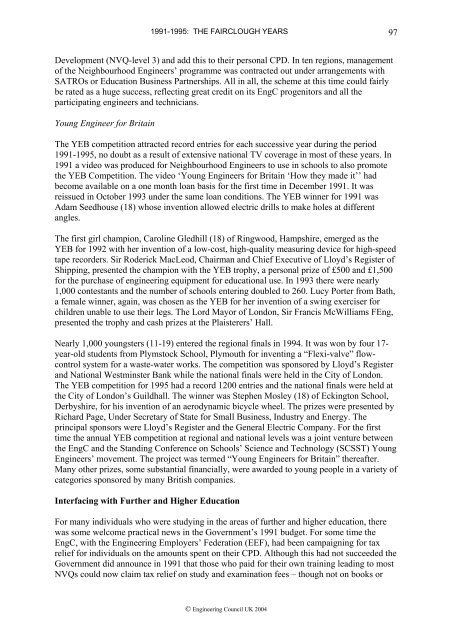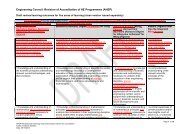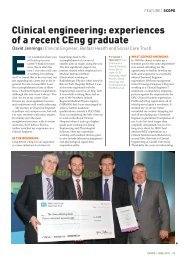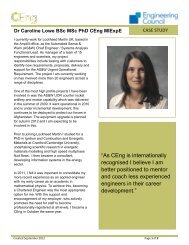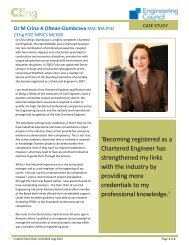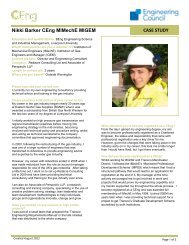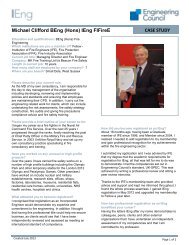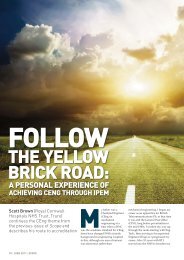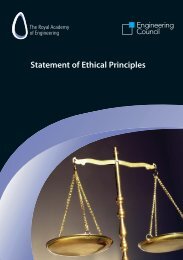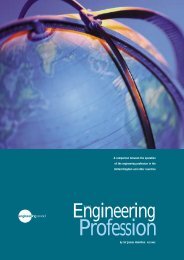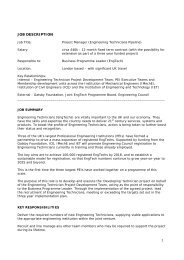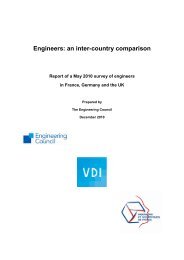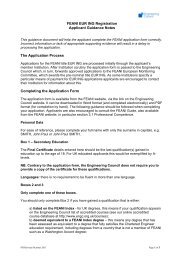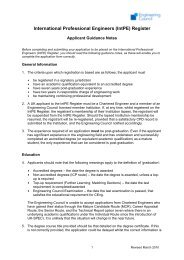An Engine for Change - A Chronicle of the Engineering Council
An Engine for Change - A Chronicle of the Engineering Council
An Engine for Change - A Chronicle of the Engineering Council
You also want an ePaper? Increase the reach of your titles
YUMPU automatically turns print PDFs into web optimized ePapers that Google loves.
1991-1995: THE FAIRCLOUGH YEARS 97Development (NVQ-level 3) and add this to <strong>the</strong>ir personal CPD. In ten regions, management<strong>of</strong> <strong>the</strong> Neighbourhood <strong>Engine</strong>ers’ programme was contracted out under arrangements withSATROs or Education Business Partnerships. All in all, <strong>the</strong> scheme at this time could fairlybe rated as a huge success, reflecting great credit on its EngC progenitors and all <strong>the</strong>participating engineers and technicians.Young <strong>Engine</strong>er <strong>for</strong> BritainThe YEB competition attracted record entries <strong>for</strong> each successive year during <strong>the</strong> period1991-1995, no doubt as a result <strong>of</strong> extensive national TV coverage in most <strong>of</strong> <strong>the</strong>se years. In1991 a video was produced <strong>for</strong> Neighbourhood <strong>Engine</strong>ers to use in schools to also promote<strong>the</strong> YEB Competition. The video ‘Young <strong>Engine</strong>ers <strong>for</strong> Britain ‘How <strong>the</strong>y made it’’ hadbecome available on a one month loan basis <strong>for</strong> <strong>the</strong> first time in December 1991. It wasreissued in October 1993 under <strong>the</strong> same loan conditions. The YEB winner <strong>for</strong> 1991 wasAdam Seedhouse (18) whose invention allowed electric drills to make holes at differentangles.The first girl champion, Caroline Gledhill (18) <strong>of</strong> Ringwood, Hampshire, emerged as <strong>the</strong>YEB <strong>for</strong> 1992 with her invention <strong>of</strong> a low-cost, high-quality measuring device <strong>for</strong> high-speedtape recorders. Sir Roderick MacLeod, Chairman and Chief Executive <strong>of</strong> Lloyd’s Register <strong>of</strong>Shipping, presented <strong>the</strong> champion with <strong>the</strong> YEB trophy, a personal prize <strong>of</strong> £500 and £1,500<strong>for</strong> <strong>the</strong> purchase <strong>of</strong> engineering equipment <strong>for</strong> educational use. In 1993 <strong>the</strong>re were nearly1,000 contestants and <strong>the</strong> number <strong>of</strong> schools entering doubled to 260. Lucy Porter from Bath,a female winner, again, was chosen as <strong>the</strong> YEB <strong>for</strong> her invention <strong>of</strong> a swing exerciser <strong>for</strong>children unable to use <strong>the</strong>ir legs. The Lord Mayor <strong>of</strong> London, Sir Francis McWilliams FEng,presented <strong>the</strong> trophy and cash prizes at <strong>the</strong> Plaisterers’ Hall.Nearly 1,000 youngsters (11-19) entered <strong>the</strong> regional finals in 1994. It was won by four 17-year-old students from Plymstock School, Plymouth <strong>for</strong> inventing a “Flexi-valve” flowcontrolsystem <strong>for</strong> a waste-water works. The competition was sponsored by Lloyd’s Registerand National Westminster Bank while <strong>the</strong> national finals were held in <strong>the</strong> City <strong>of</strong> London.The YEB competition <strong>for</strong> 1995 had a record 1200 entries and <strong>the</strong> national finals were held at<strong>the</strong> City <strong>of</strong> London’s Guildhall. The winner was Stephen Mosley (18) <strong>of</strong> Eckington School,Derbyshire, <strong>for</strong> his invention <strong>of</strong> an aerodynamic bicycle wheel. The prizes were presented byRichard Page, Under Secretary <strong>of</strong> State <strong>for</strong> Small Business, Industry and Energy. Theprincipal sponsors were Lloyd’s Register and <strong>the</strong> General Electric Company. For <strong>the</strong> firsttime <strong>the</strong> annual YEB competition at regional and national levels was a joint venture between<strong>the</strong> EngC and <strong>the</strong> Standing Conference on Schools’ Science and Technology (SCSST) Young<strong>Engine</strong>ers’ movement. The project was termed “Young <strong>Engine</strong>ers <strong>for</strong> Britain” <strong>the</strong>reafter.Many o<strong>the</strong>r prizes, some substantial financially, were awarded to young people in a variety <strong>of</strong>categories sponsored by many British companies.Interfacing with Fur<strong>the</strong>r and Higher EducationFor many individuals who were studying in <strong>the</strong> areas <strong>of</strong> fur<strong>the</strong>r and higher education, <strong>the</strong>rewas some welcome practical news in <strong>the</strong> Government’s 1991 budget. For some time <strong>the</strong>EngC, with <strong>the</strong> <strong>Engine</strong>ering Employers’ Federation (EEF), had been campaigning <strong>for</strong> taxrelief <strong>for</strong> individuals on <strong>the</strong> amounts spent on <strong>the</strong>ir CPD. Although this had not succeeded <strong>the</strong>Government did announce in 1991 that those who paid <strong>for</strong> <strong>the</strong>ir own training leading to mostNVQs could now claim tax relief on study and examination fees – though not on books or© <strong>Engine</strong>ering <strong>Council</strong> UK 2004


